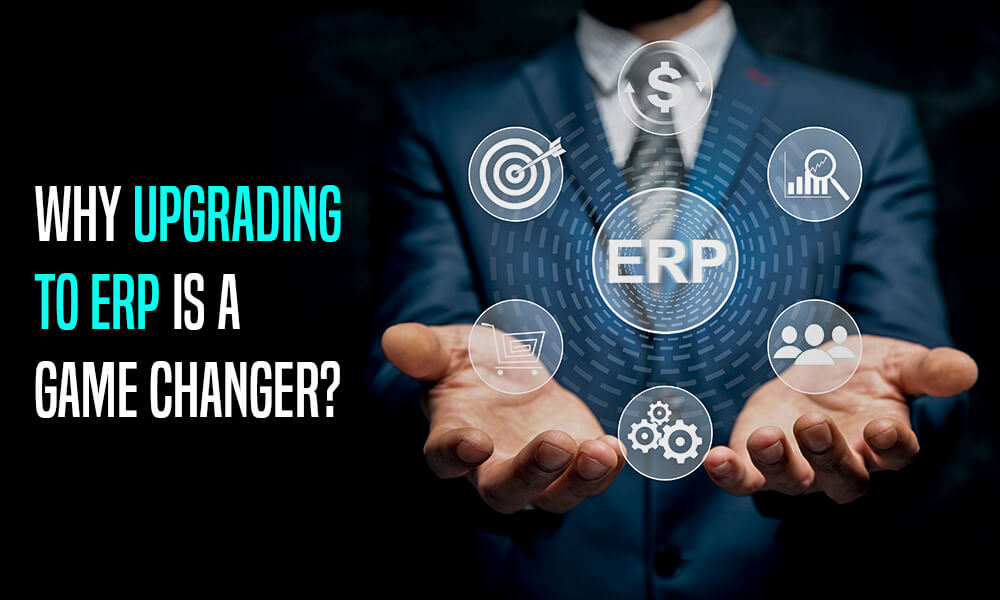Enterprise Resource Planning (ERP) systems have become the backbone of modern businesses. An ERP system enables organizations to streamline operations, enhance efficiency, and drive growth.
For a business to run successfully without any glitches you must ditch the legacy system and switch to an ERP system, as it holds immense potential to transform how businesses operate, making it a game-changing decision.
In this blog, explore why upgrading to an ERP system can be a game-changer for your business.
ERP system provides a comprehensive view of the organization’s operations. It enables managers to track performance, identify trends, and formulate strategies. With enhanced data visibility and integration, businesses can gain a competitive edge and make smart decisions that maximize profitability.
3. Streamlined IT Infrastructure:
An ERP consolidates data into a single platform, which helps simplify data organization and reduce overhead expenses. Instead of managing multiple systems and databases, the IT team can focus on maintaining and optimizing the centralized platform.
4. Enhanced Efficiency and Cost Savings:
Implementing an ERP system can significantly improve a company’s efficiency and save costs. ERP automates the manual processes, leading to reduced errors, minimal paperwork, and optimized resource allocation by automating manual processes. This not only saves time but also lowers operational costs.For example, an ERP system can automate employee onboarding, time tracking and performance management, reducing manual paperwork and streamlining HR processes.
5. Cost Savings:
ERP systems provide real-time visibility into inventory levels, demand forecasts, and supplier lead times. This enables businesses to track expenses, monitor inventory levels, and streamline purchasing processes, which results in better control over inventory investments. By optimizing inventory management, businesses can effectively minimize excess inventory carrying costs, reduce stockouts, optimize storage space and improve cash flow.
The Challenges and Best Practices of Implementing ERP
Challenges:
1. Lack of Executive Support:
Without support from top management, ERP implementation efforts may lack direction and face employee resistance. It’s essential to secure executive buy-in and involvement throughout the implementation process.
2. Scope Creep:
When the project’s scope expands beyond its original boundaries, the ERP system can suffer from scope creep. This can lead to delays in work, increased costs, and decreased satisfaction with the final product.
3. Data Migration:
Migrating data from legacy systems to the new ERP system can be daunting. Data cleansing, mapping, and validation are critical to ensuring the accuracy and integrity of data during the migration process.
4. Customization Complexity:
Although ERP systems can be customized to align with specific business requirements, they can raise complexity and increase implementation time and costs. It becomes crucial for the management to balance customization with the need for standardization and best practices.
5. Integration Challenges:
Integrating the ERP system with existing third-party applications and systems can be challenging, especially if different technologies or data formats are being used. A seamless integration is crucial to maximizing the ERP system’s benefits.
6. Resource Constraints:
ERP implementation requires dedicated resources in terms of time, money, and personnel. Limited resources can impact the implementation timeline and quality of the final deliverable.
Best Practices:
1. Clarify Objectives:
Establish business objectives, including expected outcomes and benefits, aligned with the organization’s strategic goals to secure support from senior management.
2. Manage Scope Effectively:
Establish a robust scope management process to prevent scope creep. Establish clearly defined scopes, deliverables, and boundaries for the project and implement effective control mechanisms for scope changes.
3. Prioritize Data Management:
Create a comprehensive migration plan and ensure data integrity during migration. Allocate time and resources to data management activities, such as data cleansing, mapping, and validation.
4. Limit Customizations:
Minimize customization of the ERP system wherever possible to reduce complexity and implementation time. Prioritize standardization and best practices to leverage the pre-built functionality of the ERP system.
5. Ensure Integration Readiness:
Establish a comprehensive integration plan during the ERP implementation process to ensure seamless data exchange between the ERP and other systems.
6. Allocate Sufficient Resources:
Allocate adequate resources, including time, budget, and personnel, for the ERP implementation project. If needed, consider outsourcing specific tasks or hiring external consultants to supplement internal resources and expertise.
Conclusion
ERP innovations that help your business run efficiently are not just technological advancements; they are strategic tools that drive operational excellence, enhance productivity, and position your business for sustained success in today’s competitive landscape.
ERP adoption facilitates the integration of various business processes and data into a centralized system, allowing for streamlined processes and improved efficiency.
From streamlining processes and improving efficiency to providing real-time insights and enhancing collaboration, ERP systems selected from a trusted ERP vendor like Sourcepro offer a wide range of benefits that can revolutionize your business operations.
Upgrading to ERP is not just a smart investment; it’s a game changer for businesses looking to stay competitive in today’s dynamic marketplace.
Sourcepro helps address the challenges so your organization can follow the best practices and maximize the benefits of ERP software. If you are looking for a high-value ERP solution provider, reach out to us right away!
